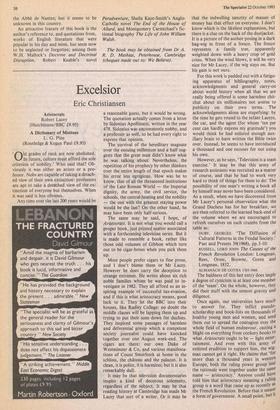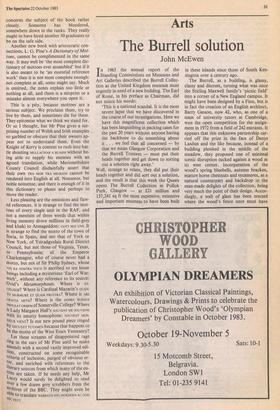Excelsior
Eric Christiansen
Aristocrats Robert Lacey
(Hutchinson/BBC £9.95) A Dictionary of Mottoes L. G. Pine (Routledge & Kegan Paul £9.95)
Old grades of rank are now abolished. In future, culture must afford the sole criterion of nobility.' Who said that? Ob- viously it was either an aristo or a pro- fessor. Nobs are capable of taking a detach- ed view of their own extinction: professors are apt to take a detached view of the ex- tinction of everyone but themselves. When it was said is less obvious.
Any time over the last 200 years would be a reasonable guess, but it would be wrong. The quotation actually comes from a letter by Sidonius Apollinaris, written in the year 478. Sidonius was uncommonly nobby, and a professor as well, so he had every right to express that opinion.
The survival of the hereditary magnate over the ensuing millenium and a half sug- gests that the great man didn't know what he was talking about. Nevertheless, the repetition of his prophecy by other thinkers over the entire length of that epoch makes his error less egregious. How was he to know, that of all the threatened institutions of the Late Roman World — the Imperial dignity, the army, the civil service, the schools, the central heating and the nobility — the one with the greatest staying power would be the last? On the other hand, he may have been only half-serious.
The same may be said, I hope, of Aristocrats. It is not what you would call a proper book, just printed matter associated with a forthcoming television series. But it is made to resemble a book, rather like those odd volumes of Gibbon which turn out to be cigar-boxes when you pick them up.
Most people prefer cigars to fine prose, and I don't blame them or Mr Lacey. However he does carry the deception to strange extremes. He writes about six rich noble families whom he was paid to in- vestigate in 1982. They all afford us an in- spiring example of successful tax-evasion, and if this is what aristocracy means, good luck to it. They let the BBC into their houses, like Radley College: no doubt the middle classes will be lapping them up and trying to put their sons down for duchies. They inspired some passages of harmless and deferential gossip which a competent society journalist could have knocked together over one August week-end. The cigars are there: our own Duke of Westminster & Co, and various manifesta- tions of Count Smorltork at home in the schloss, the château and the palazzo. It is clean, it is polite, it is harmless; but it is also remarkably dull.
It may be that television documentaries inspire a kind of decorous solemnity, regardless of the subject. It may be that reading history at Cambridge has made Mr Lacey that sort of a writer. Or it may be that the indwelling sanctity of masses of money has that effect on everyone. I don't know which is the likeliest explanation, but there is a clue on the back of the dustjacket.
It is a picture of the author posing in a dark bag-wig in front of a fresco. The fresco represents a family tree, apparently weighted down with a heavy crop of gold coins. When the wind blows, it will be very nice for Mr Lacey, if the wig stays on. But his gain is not ours.
For this work is padded out with a fatigu- ing apparatus of bibliography, notes, acknowledgments and general carry-on about world history when all that we are really being offered is some harmless chit- chat about six millionaires not averse to publicity on their own terms. The acknowledgments alone are stupefying: by the time he gets round to the infant Laceys, the cat, and the agent (for whom 'ten per cent can hardly express my gratitude') you would think he had enlisted enough aux- iliary brain to have written the Bible twice over. Instead, he seems to have introduced a thousand and one excuses for not using his own.
However, as he says, 'Television is a team exercise.' It may be that this army of research assistants was recruited as a matter of course, and that he had to work very hard to think of things for them to do. The possibility of one man's writing a book all by himself may never have been considered. As a result, when we have discovered from Mr Lacey's personal observation what the Grand Duchess has for her breakfast, we are then referred to the learned back-end of the volume where we are encouraged to refresh ourselves on such crumbs from the table as:
DUBY, GEORGES. 'The Diffusion of Cultural Patterns in the Feudal Society.' Past and Present 39(1968), Pp.3-10: RUSSELL, LORD JOHN The Causes of the French Revolution London: Longman, Rees, Orme, Browne, Green and Longman, 1832.
ALMANACH DE GOTHA 1765-1944.
The baldness of this last entry does implY a degree of cynicism in at least one member of the 'team'. On the whole, however, they did their stuff with the utmost gravity and diligence.
Once again, our universities have much to answer for. They inflict pseudo
scholarship and book-lists on thousands of healthy young men and women, and send them out to spread the contagion over the whole field of human endeavour, casting a blight on everything from cookery books to what Aristocrats ought to be — light enter- tainment. And even with this army of enlisted erudition to support him, the wig' man cannot get it right. He claims that 'for more than a thousand years in western Europe, both the ruling power group and the rationale went together under the same name — aristocracy.' Anyone could have told him that aristocracy meaning a ruling group is a word that came up as recenilY the French Revolution. Before that it meant a form of government. A small point, but it
concerns the subject of the book rather closely. Someone has blundered, somewhere down in the ranks. They really ought to have hired another 50 graduates to be on the safe side.
Another new book with aristocratic con- nections, L. G. Pine's A Dictionary of Mot- toes, cannot be complimented in the same way. It may well be 'the most complete dic- tionary of mottoes ever assembled' but if it is also meant to be 'an essential reference work' then it is not most complete enough: not complete at all, some might say. Much is omitted, the notes explain too little or nothing at all, and there is a misprint or a mistake almost everywhere you open it.
This is a pity, because mottoes are a serious subject. We proclaim them, try to Live by them, and sometimes die for them. They epitomise what we think we stand for. Or so I thought, but Mr Pine gives a sur- prising number of Welsh and Irish examples so garbled or obscure that their owners ap- pear not to understand them. Even the Knight of Kerry is content to rush into bat- tle shouting MULLACHAR A BUADH without be- ing able to supply his enemies with an agreed translation, while Merionethshire County Council disdainfully assert that their own TRA MOR TRA MEIRION cannot be rendered into English at all. Nonsense, but noble nonsense, and there is enough of it in this dictionary to please and perhaps to move the reader.
Less pleasing are the omissions and flaw- ed references. it is strange to find the mot- toes of every single unit in the RAF, and not a mention of three words that within living memory drove millions in field-grey and khaki to Armageddon: GOTT MIT UNS. It is strange to find the motto of the town of Soria, in Spain, and not that of York or New York, of Ystradgynlais Rural District Council, but not those of Virginia, Texas, or Pennsylvania; of the Emperor Charlemagne, who of course never had a motto, but not of Sir Philip Sydney, whose VIX EA NOSTRA VOCO is ascribed to ten lesser beings including a mysterious 'Earl of War- Wich', without any reference to its source: Ovid's Metamorphoses. Where is EX- CELSIOR? Where is Cardinal Mazarin's QUAN. TO MURMURE ET QUAM ERUSTRA? Where is ARS GRATIA ARTIS? Where is the DONEC RURSUS IMPLEATORBEM of Somerville College? Where IS Lady Margaret Hall's SOU VENT ME SOUVIENS With its smutty homophone: SOUVENT MON- SIEUR VIEN1? Is our new pound piece ringed by DECUS Er TUTAMEN because that happens to be the motto of the West Essex Yeomanry?
Let these screams of disappointed rage ring in the ears of Mr Pine until he make amends with a second vastly improved edi- tion, constructed on some recognisable criteria of inclusion, purged of obvious er- ;.,°r, and enriched with references to the literary sources from which many of the en- tries
are taken. If he needs any help, Mr
"cey would surely be delighted to send over a few dozen grey scrubbers from the archives of the BBC. They might even be able to translate NABBATI-I HIG 11ORDERN AC GOD 11 IC EMIT.















































 Previous page
Previous page